Since launching ZI Labs in May 2022, we’ve been meeting with go-to-market (GTM) leaders, customers, and analysts to learn more about how we can help solve the most urgent problems facing their businesses today.
Longer sales cycles. Increasingly discerning buyers. More meetings with more stakeholders. Intensifying competition. Economic uncertainty.
These are all challenges facing GTM professionals at companies of every size, in every industry. But while many leaders recognize the need to leverage the tools and technologies at their disposal more effectively, we hear the same question time and again from long-time customers and prospects alike:
How?
To answer this question, we’ve spent months developing an entirely new way for GTM leaders to identify and execute proven, data-driven strategies that drive revenue.
Introducing the brand-new GTM Plays.
Automating GTM Motions
It’s no secret that a robust playbook is a huge advantage for revenue teams of any size. In fact, a Bain & Co. study of hundreds of sales teams found that companies with detailed, scalable sales plays consistently posted better revenue and market share growth than their competitors.
Putting those ideas into practice, however, is no easy feat. That’s what makes ZoomInfo’s GTM Plays such an essential tool for GTM teams seeking to boost revenue. Plays allow sales and marketing teams to target specific audiences with customized, automated motions to achieve specific business objectives.
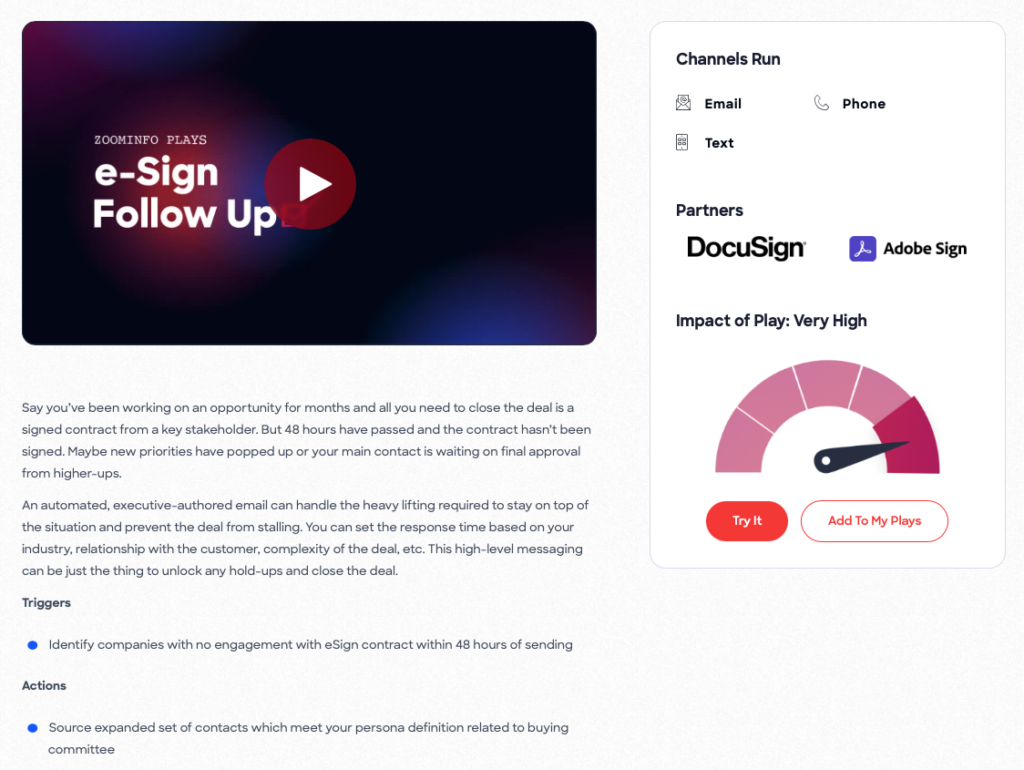
Each of the strategies in ZoomInfo’s library of Plays includes data on channels applicable to each Play, such as Ads, Chat, and Email, as well as a visual of that Play’s impact. Each Play also includes instructional how-to content showing exactly how to implement and execute each strategy.
Now, ZoomInfo users can do this in a seamless experience from a single platform. As part of improved Workflows, users logged into ZoomInfo can browse our Plays, find executable ideas that align with their business goals, and customize Workflows based on specific scenarios right away. Users can create custom plays of their own for later use, or deploy them immediately within the same experience.
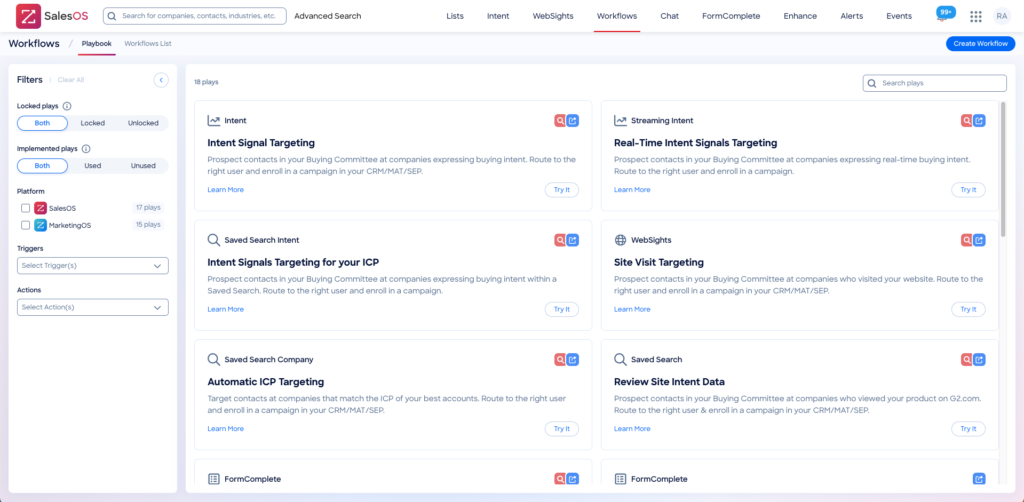
When we launched Plays, we engaged with hundreds of customers about the challenges they faced, the strategies they were using, and the specific plays they wanted to see. The response was overwhelming, and much of that feedback was incorporated directly into Plays.
Since its inception, Plays has been a strongly community-driven effort. Customer feedback has been instrumental in shaping ZoomInfo’s Plays, and has been a driving force behind the launch of the improved Workflows and the new Plays experience.
Our community has been generous and thoughtful with its strategic, actionable feedback, and sharing the results of that ongoing work allows us all to grow, improve, and win together.
In addition to the Triggers and Actions already featured in Plays, Workflows include relevant templates, including popular community requests such as dynamic examples powered by ChatGPT.
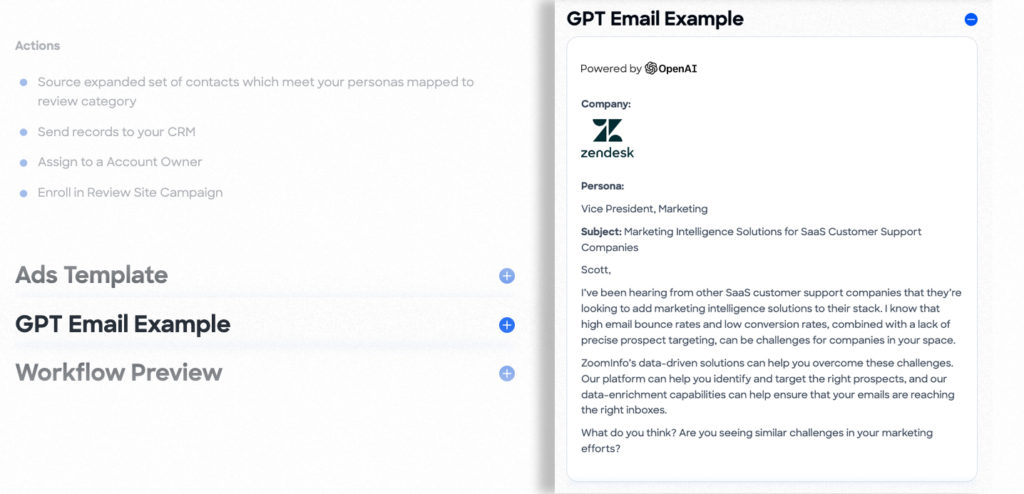
Users will also be able to see an array of partners and providers whose tools and data can help bring each play to life.
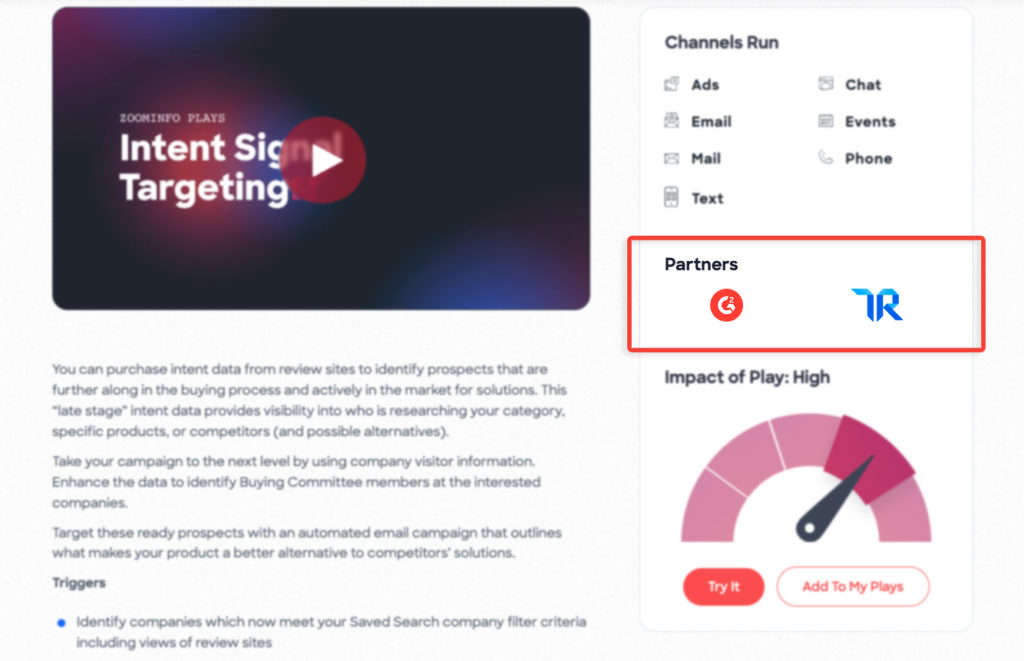

While GTM Plays are the most effective way to build customized, automated GTM motions for your teams, doing so in isolation will only go so far. Today’s sales and marketing leaders recognize that their GTM strategies must serve broader growth objectives.
As we’ve developed Plays and Workflows, customers have asked us how to identify which Plays are best-suited to their businesses, goals, and challenges, and how they can develop roadmaps toward creating more complex, sophisticated, orchestrated GTM motions.
To that end, we have developed a framework to help companies identify where they are in their current GTM efforts and how they can maximize the revenue impact of their automated strategies – the Modern GTM Index.
Introducing ZoomInfo’s Modern GTM Index
Initially developed as an internal concept by Andrew Riesenfeld, ZoomInfo’s senior vice president of business development, the Modern GTM Index measures a company’s current level of data sophistication and charts that alongside its level of engagement complexity.
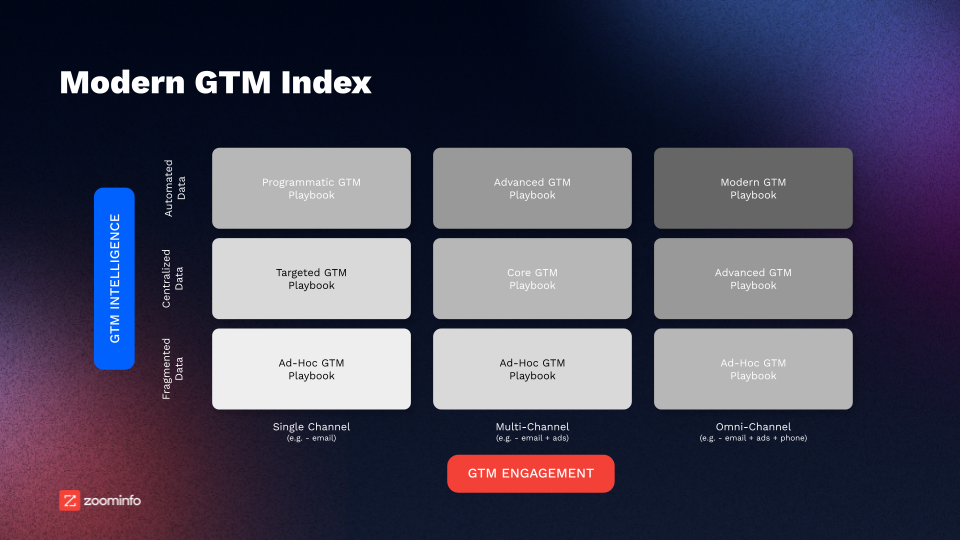
“ZoomInfo’s Modern GTM Index supports companies in their pursuit of growth by evaluating the maturity of their data and engagement systems. The Index helps customers drive automation and efficiency, leading to orchestrated GTM plays and ultimately resulting in increased success and growth.”Andrew Riesenfeld, SVP of Business Development
For many companies, implementing an automated GTM playbook-driven strategy is an aspirational goal. ZoomInfo has more than 30,000 customers — from small businesses to large enterprises, including PayPal, Unilever, and Snowflake — all of which are at various stages in the Modern GTM Index. Some companies are already pushing upward and to the right, realizing ambitious GTM visions with sophisticated intelligence and engagement working in concert. Others are just starting out, with less data across fewer channels.
The Modern GTM Index allows companies to quickly identify where they currently align in terms of GTM intelligence sophistication and engagement complexity, and the actions they should take to see greater returns.
For companies just beginning their GTM journeys, even modest initial investments in data and engagement technologies can result in dramatic results, and can be implemented quickly.
For established enterprises, the Modern GTM Index represents an opportunity to scale and mature their GTM initiatives. While the curve will flatten over time as the steps grow in complexity, a 30% improvement in evergreen motions with automated data – toward the top-right of the Index – has a far greater absolute impact than a 300% improvement in nascent, one-time motions relying on fragmentary data.
ZoomInfo Workflows and the Modern GTM Index
A company’s position on the Modern GTM Index can be determined by the sophistication of its data, and the complexity of its engagement.
Individual Plays are possible at every stage of the Index, with specific Plays becoming increasingly complex and coordinated as companies progress along the curve.
Initially, many companies will most likely be working with fragmented data and executing Plays across a single channel or on a one-time basis. To progress along the curve, companies should be investing in centralized and ultimately automated data assets, and executing Plays in increasingly coordinated, multichannel motions.
GTM for All
We believe that every business should have access to the tools and data they need to expand into new markets and reach new audiences with their products and services.
Every day, business leaders are being told that the only way to succeed in a challenging market is to leverage data and automation to scale their companies – but nobody is saying how.
That changes today.
By leveraging ZoomInfo Workflows and the Modern GTM Index, businesses can identify the steps they need to take in order to see greater return on investment from their GTM initiatives. From nascent, one-time plays to orchestrated, omnichannel motions, ZoomInfo is helping businesses overcome their most urgent challenges and achieve meaningful growth in an unprecedented market.
But this growth isn’t as simple as merely investing in more technology or additional data. Moving up and along the curve of the Modern GTM Index requires change management, a strong understanding of your teams’ core competencies, and close interdepartmental alignment.
Over the coming weeks and months, we’ll be helping businesses understand the Modern GTM Index, identify their current place within it, and create customized, immediately deployable workflows that align with their business goals.
We couldn’t be more excited to begin the next phase of our mission to help sales and marketing leaders not just survive in a turbulent market, but meet ambitious growth goals and seize the immense opportunities that GTM automation can achieve – and we can’t wait for you to join us.


